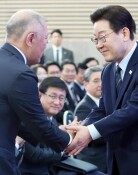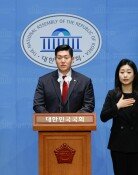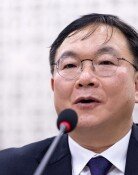Korean peninsula vs. Bush adm. (2)
Powell`s Korea policy
Korean peninsula vs. Bush adm. (2)
Powell`s Korea policy
Posted January. 19, 2001 13:04,
(1) Will N.K.-U.S. framework change?
(2) Powell`s Korea policy
(3) Revision of North Korean aid policy
(4) Impact of NMD and TMD
(5) Reduction of U.S. forces in Korea
(6) How to coordinate North Korea policies?
(7) Pressure to rise for market opening
The incoming George W. Bush administration's Korea policy direction revealed Wednesday by Secretary of State-designate Colin Powell at his Senate confirmation hearing was more moderate than anticipated.
At the hearing Powell said that the Bush administration would support the historical inter-Korean reconciliation being pursued by South Korea and abide by the 1994 Agreed Framework reached in Geneva between North Korea and the United States, so long as Pyongyang observes it. This is to show his viewpoint giving positive assessment to the inter-Korean dialogue and the outgoing Clinton administration's engagement policy with the North.
However, Powell attached a strict condition to the Bush administration's North Korea policy direction. He contended that the new administration would accommodate the engagement policy so long as Pyongyang addresses political, economic and security concerns. In connection with the improvement of U.S. relations with the North, he noted that, even if bilateral negotiations were settled, this should be verified and considered as a very useful deal.
The Powell statement endorsed the Clinton administration's engagement policy with North Korea but at the time forecast a new North Korea policy line characterized by the appropriate applications of two words, reciprocity and verification.
The related government officials welcomed the Powell policy direction, saying that his statement neutralized the Seoul government concern over the Bush administration's possible critical view of the Seoul government's North Korean policy and friction or confrontation over their policy directions toward Pyongyang.
Reciprocity toward the North:
Powell's statement regarding the Geneva agreement and the inter-Korean and the North-U.S. dialogues premised his positive evaluation of the North Korean position.
Recalling that the Clinton administration has never abandoned the North Korea policy of reciprocity, the related government officials said the disparity in the positions between the Clinton and Bush administrations would rest with how many opportunities are given to the Pyongyang regime for its "reciprocal changes," for instance, four times given by the Democratic administration and only once by the Republican government.
The U.S. secretary of state-designate, recalling that President-elect Bush revealed his willingness to accommodate the results of the Clinton administration's negotiations on the North Korean missile program, also warned that the United States would not relax its vigilance over the North, as long as Pyongyang deploys conventional armed forces beyond its self-defense level and continues to develop unconventional weapons.
Meaning of dictator:
Powell called North Korean Defense Commission Chairman Kim Jong-Il dictator of the North. Some U.S. watchers explained that the word, dictator, has a meaning of an unreliable ruler. The fact that Powell called Kim, a partner of the ongoing inter-Korean dialogue, a dictator despite his positive assessment of the development can be construed that Powell challenged the North Korean leader to come up with a clear sign of rejecting himself as a dictator, they analyzed.
Accordingly, the North Korean-U.S. relationship under the Bush administration will be dictated by Washington's verification of the North Korean change and Pyongyang's accommodation of the American demands, the experts predicted.
Will the Bush administration conduct an overall revision of North Korea policy?
Powell stated in this connection that he has in mind the all-present achievements in relation with the North and that he would utilize this when an overall review of the North Korea policy has been made.
Meanwhile, Seoul government officials, noting that it is routine to reappraise foreign policies whenever a new administration is installed, stressed that it would be excessive interpretation that the Powell statement meant to shape a new North Korea policy from the beginning.
Boo Hyung-Kwon bookum90@donga.com







